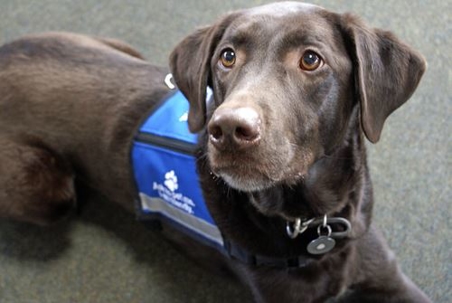Many people confuse Emotional Support Animals (ESA) with Psychiatric Service Dogs (PSD) and other specialized service animals because the terms are often used interchangeably. However, ESAs are not covered under the Americans with Disabilities Act of 1990, nor are the dogs trained to behave appropriately in public. The only purpose of an ESA is to provide companionship and emotional comfort to people suffering from anxiety, depression, PTSD, and other potentially disabling mental conditions. Like service dogs, these animals can accompany their owners on airline flights and are legally protected under the Air Carrier Access Act.
Unfortunately, many people take advantage of this law to bring potentially dangerous animals into airports. There are dubious online registries, including The Official ESA Registration of America, that will certify any pet as an “emotional support animal” so long as the handler passes their therapist’s assessment process. Some people don’t even need to go that far – you can purchase service dog paraphernalia and even Service Dog ADA Info Cards through Amazon Prime. So, it shouldn’t come as a surprise that people are taking advantage of this system to take household cats and dogs onto flights. In fact, United has noted a 75% increase in the number of customers bringing ESAs onto flights. The problem is that these animals are damaging property and seriously injuring airport travelers.
The Threat Of An Untrained Support Animal
On December 18, 2017, 5-year-old Gabriella Gonzalez was attacked by an Emotional Support Animal at Portland International Airport. While her mother was buying coffee, Gabriella asked if she could pet Michelle Brennan’s emotional support pit bull. When Gabriella reached out a hand to pet the dog, it bit her in the face.
Gabriella’s mother, Mirna Gonzalez, has filed a $1.1 million lawsuit against Michelle Brennan, Alaska Airlines, and the municipal agency Port of Portland. According to the claim, Gabriella “suffered injury to the muscles, tendons, bones, nerves and soft tissue of her face, eye, eyelid, tear duct and lip, as well as emotional trauma…As a result of the incident, Gabriella Gonzalez required surgery to repair complex facial lacerations and a damaged tear duct, and has incurred medical expenses and will incur future medical expenses.”
The claim states that all three defendants exhibited negligence that led to Gabriella’s injuries. For example, Brennan should have known that her pit bull was “displaying threatening and aggressive behavior and possessed vicious propensities.” Thus, she shouldn’t have taken her pet to a location where it could harm members of the public. Likewise, Alaska Airlines and the municipal agency Port of Portland shouldn’t have let Brennan enter the Gate 7 waiting area with an unregistered pet that isn’t trained to interact with strangers.
Chapters 2 and 6 of the Portland International Airport Rules prohibits passengers from bringing animals into the airport unless:
- They are in crates or other approved containers
- They are trained and registered service animals
- They are trained and registered law enforcement animals
Sadly, this isn’t the first time an ESA has been the source of a lawsuit. On February 28, 2019, Meagan Flynn, a writer for The Washington Post, released an article examining various high-profile ESA assaults across the country. Chad Stavley, Gabriella’s attorney, told Flynn that he hopes this lawsuit will pressure airports and airlines to revise their policies surrounding ESAs and fraudulent service animals. He is also investigating if the dog that bit Gabriella is even a legitimate Emotional Support Animal. As Stavley explains, “There’s a lot of abuse of this emotional support animal situation, and folks who have legitimate service animals – people who are blind and need guide dogs and the like – are kind of getting thrown into the same boat [as emotional support animals]. It shines a poor light on those folks.”
Fortunately, the Department of Transportation is already reviewing and revising its rules for service and support animals. Their goal is to include measures that prevent fraudulent and dangerous pets from boarding flights in the future.
Injured by an Emotional Support Animals? Call Biren Law Group Today.
Per California Civil Code § 3342, a negligent handler can be held responsible for the actions of their untrained support animal. If you or your child has been injured by a dangerous ESA, contact the Los Angeles dog bite lawyers at Biren Law Group today. Our legal team has been providing knowledgeable guidance and exceptional legal services to the residents of California for over 40 years. Each of our attorneys has a comprehensive understanding of the protocols and regulations surrounding personal injury law. With our help, you can secure compensatory damages that reflect your legal and financial objectives.
We provide our services on a contingency fee basis. Contact Biren Law Group at (310) 774-0078 to schedule a consultation.

